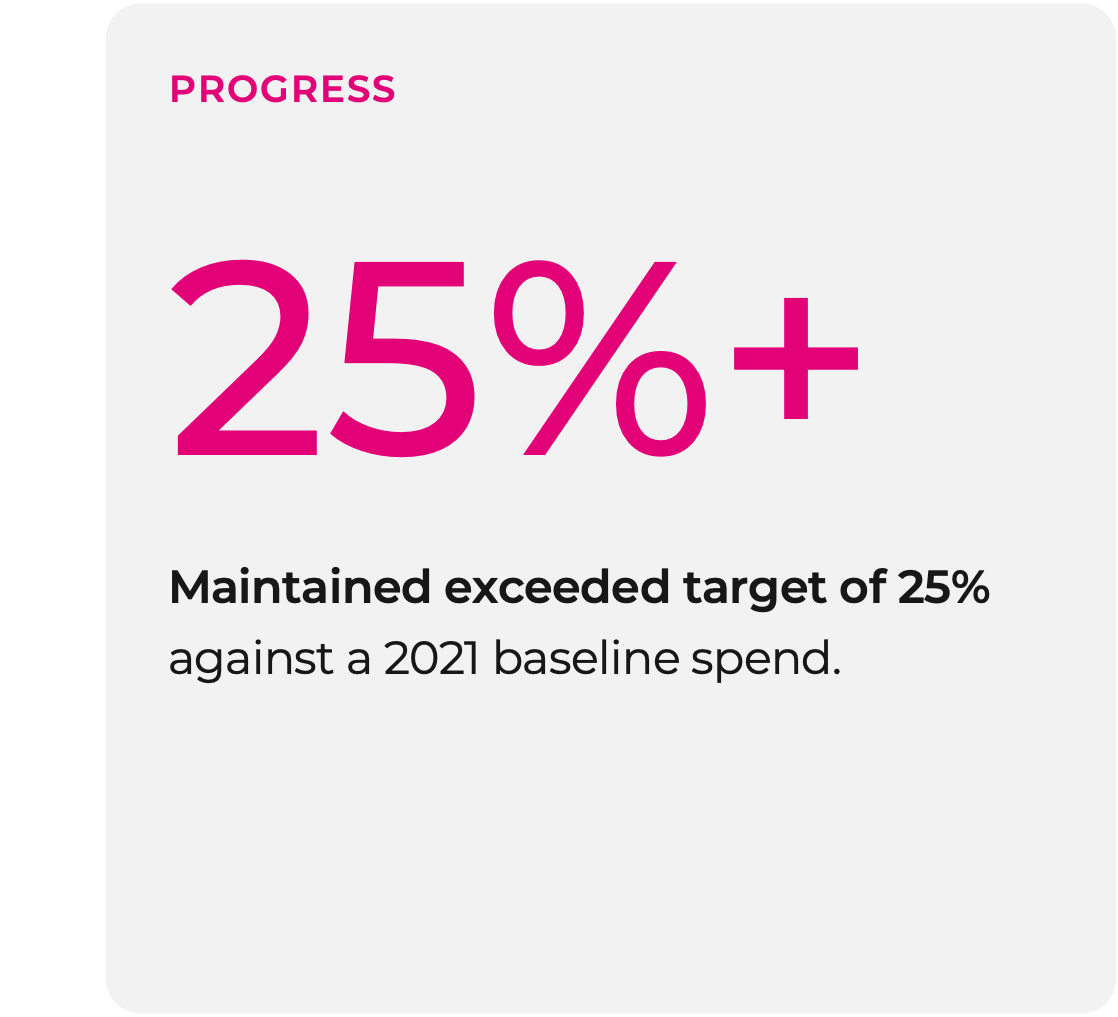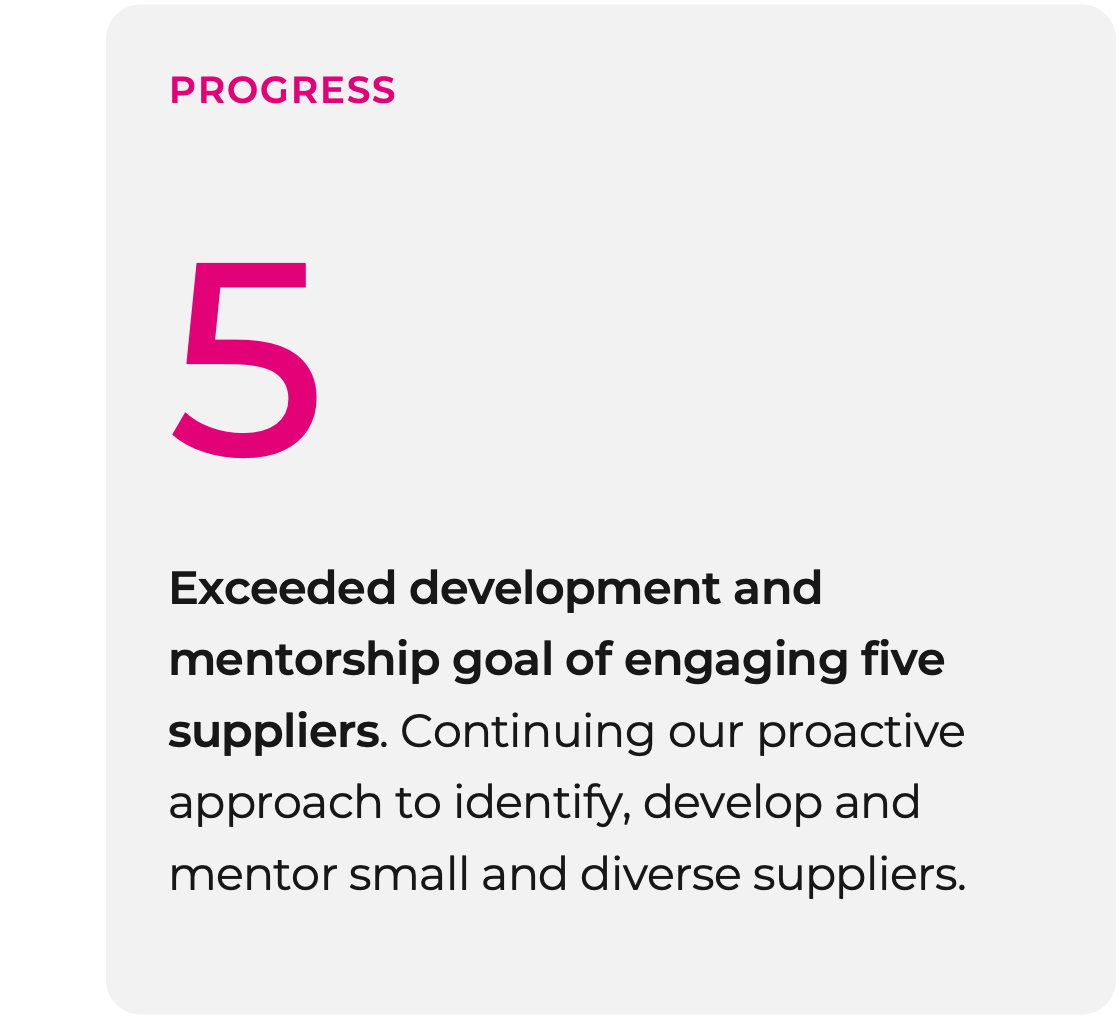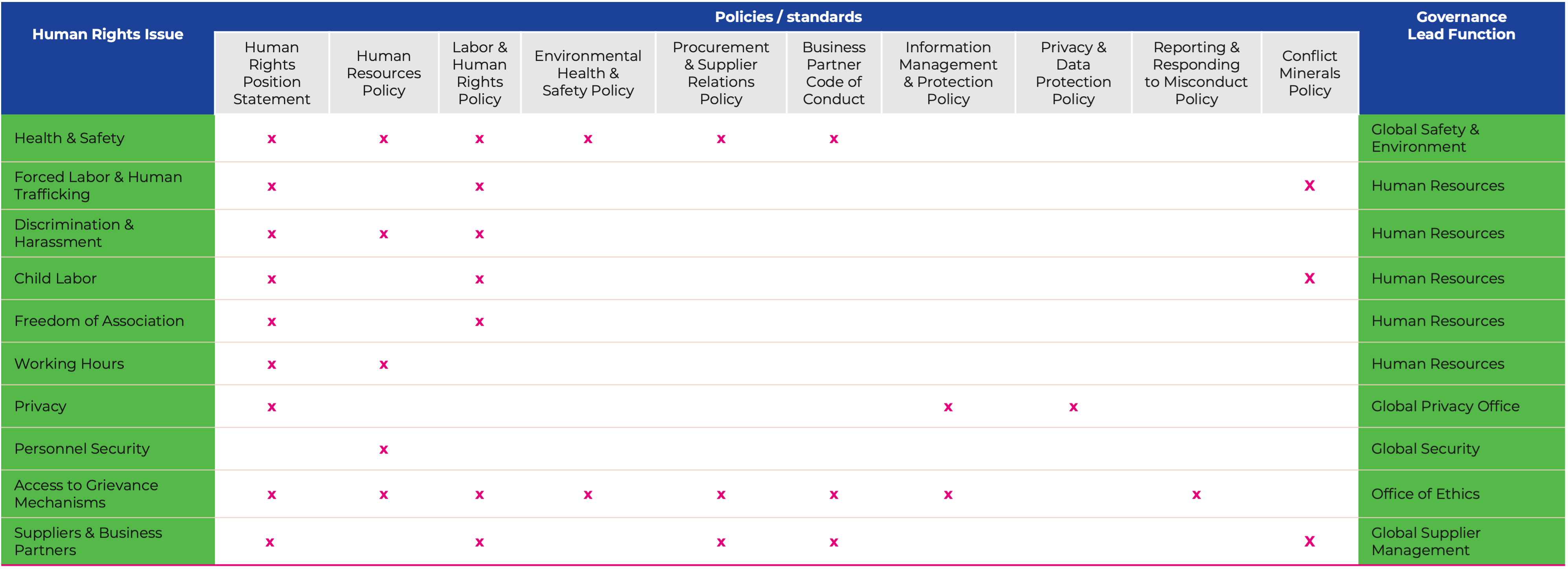Procurement and supply chain
We seek to build a sustainable, diverse supply chain as part of our efforts to create positive economic impact. We work toward this goal by partnering with diverse suppliers who share our goals for women’s health and economic prosperity.

Governance
Our procurement and supply chain activities are overseen by the Vice President, Global Procurement and Supplier Management, who reports to the head of Global Business Services. Our business partners commit to our Business Partner Code of Conduct, which aligns with the Pharmaceutical Supply Chain Initiative’s Pharmaceutical Industry Principles, the 10 Principles of the U.N. Global Compact and our Code of Conduct.
Speak up
Employees and contractors anywhere in the world who are concerned about an ethics issue can utilize the Speak Up ethics hotline which is operated by a third-party service provider. Speak Up lets employees address work-related concerns online, via a mobile site or over the phone 24 hours a day, seven days a week, in 29 different languages. Reporting employees can choose to remain anonymous.
We believe our relationships with suppliers should always be ethical. We seek to obtain the goods and services we need in ways that are lawful, efficient and fair. Our supplier relationships include risk assessment, a Business Partner Code of Conduct, a well-constructed contract and a monitoring and audit program. Our internal procedures govern our expectations and requirements for material suppliers, service providers or contractors that have a direct impact on product quality. We verify these expectations and requirements both when a supplier is initially engaged and periodically thereafter. We require suppliers to complete a self-assessment questionnaire (SAQ) that covers privacy, anti-bribery and corruption due diligence, financial risk, conflict minerals evaluation, cybersecurity and other issues related to their work with us.
Interested in doing business with Organon? Learn more about our work with suppliers
Supplier diversity

Supplier diversity enhances innovation and creativity through the intentional inclusion of diverse perspectives and solutions, boosting market competitiveness and customer loyalty. Supporting diverse suppliers fosters economic empowerment in underrepresented communities, contributing to a more equitable economy and mitigating supply chain risks by providing alternative sources. It meets compliance and corporate responsibility expectations and grants access to new markets and growth opportunities. This diversity strengthens the supply chain with flexibility, faster turnaround times and competitive pricing, while enhancing our reputation and brand loyalty among socially conscious consumers, potential employees and investors.
Progress on goals
Aim to increase addressable spend with diverse suppliers by 25% from a 2021 baseline, by 2025.

Aim to engage at least five new or existing suppliers in a development and mentorship program.


Our approach for supplier diversity and engagement
Our leadership plays a vital role in setting the tone and championing supplier diversity both within the organization and externally. This ongoing commitment from our leaders is essential for the success of our supplier diversity initiatives.
We have an established Supplier Diversity Policy that outlines our commitment to supplier diversity. Each year, we establish clear targets and metrics for our supplier diversity program, helping us track and evaluate its impact. To ensure transparency, we monitor and communicate progress through monthly reporting. A dedicated supplier diversity lead collaborates with category leads to identify opportunities for diverse suppliers and monitors our supplier diversity goals.
We work with our procurement teams to identify and engage with potential diverse suppliers. This involves attending supplier diversity-focused conferences, using supplier databases and networking with organizations that certify diverse businesses.
We support capacity building for women and diverse suppliers by offering mentorship and training designed to help them meet our requirements and scale their businesses.
We continually review our program to identify areas for improvement by benchmarking against industry standards and adapting to new challenges and opportunities.
We have also continued to develop our supplier mentorship program, which aims to help diverse suppliers better support Organon and companies like ours, contributing to increased diversity in our broader ecosystem.
As part of these efforts, we partnered with our diversity, equity, inclusion and belonging team and leveraged the expertise of our employee resource groups to create broader awareness and collaborate on strategies for expanding our relationships.
Supplier environmental assessment
We strive to conduct business with individuals and organizations who share a similar vision and commitment to environmental stewardship and sustainability.
Our Business Partner Code of Conduct includes requirements related to ESG, including environmental sustainability. We expect our suppliers to conserve natural resources and engage in activities aimed at reducing water usage, energy consumption and greenhouse gas (GHG) emissions. A team within our global Safety, Health and Environment organization periodically screens our external manufacturers of active pharmaceutical ingredients and finished products for environmental health and safety compliance as part of our External Partner Evaluation Program. The screening includes topics such as regulatory compliance, fatalities and major incidents and environmental impact.
Organon is an associate member of the Pharmaceutical Supply Chain Initiative (PSCI), a group of pharmaceutical and healthcare companies that share a vision of better social, health, safety and environmental outcomes in the communities touched by our supply chain. We belong to working groups within PSCI with the goal of gaining and sharing knowledge and expertise across the industry.
Learn more about our work on environmental practices
Human rights

Respect for human rights is a fundamental part of our mission to deliver impactful medicines and solutions for a healthier every day.
Discrimination, forced labor, slavery and other human rights violations are prohibited. Our Human Rights Statement clearly details our position, as well as our expectations within our own operations and our supply chain.
We use a third-party risk assessment process to help ensure our suppliers respect human rights. New suppliers that we determine are at significant risk for child labor or compulsory labor due to their geographic location or type of operation are required to complete a SAQ.
This assessment covers:
- Freely chosen employment
- Child labor and young workers
- Employment practices and disclosures
- Fair treatment
- Wages, benefits and working hours
- Freedom of association
- Privacy and data protection
- Environment, health and safety management systems
- Business integrity
- Improper advantage
- Identification of concerns
- Protecting information
- Intellectual property
- Responsible sourcing of minerals
- Animal welfare
- Compliance history
In addition, we have a mature supplier due diligence program that assesses supplier privacy compliance, anti-bribery and corruption risk, financial risk, conflict minerals evaluation and other issues related to suppliers’ work with us.
We have policies, processes, training and monitoring systems in place to address key human rights issues. In addition, our top suppliers pay above living wage in key growth markets. We expect our suppliers to adhere to our Conflict Minerals Public Policy Statement itemizing our expectations around 3TG usage for our suppliers.

Learn more about our ESG governance, ethics and compliance, privacy and data security, public policy and political contributions and tax